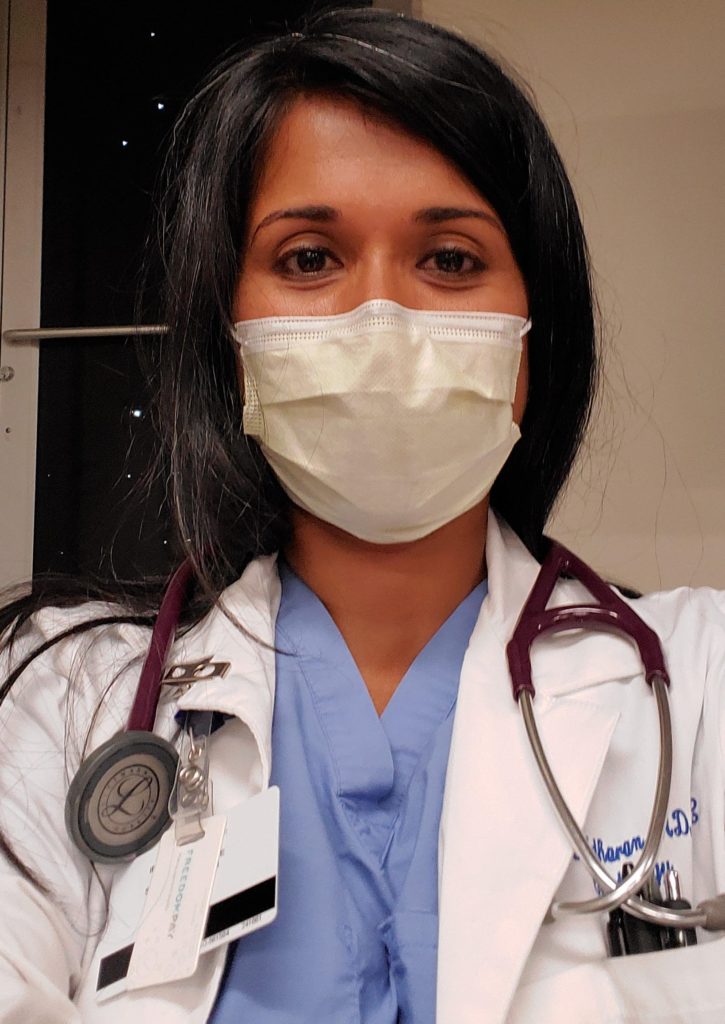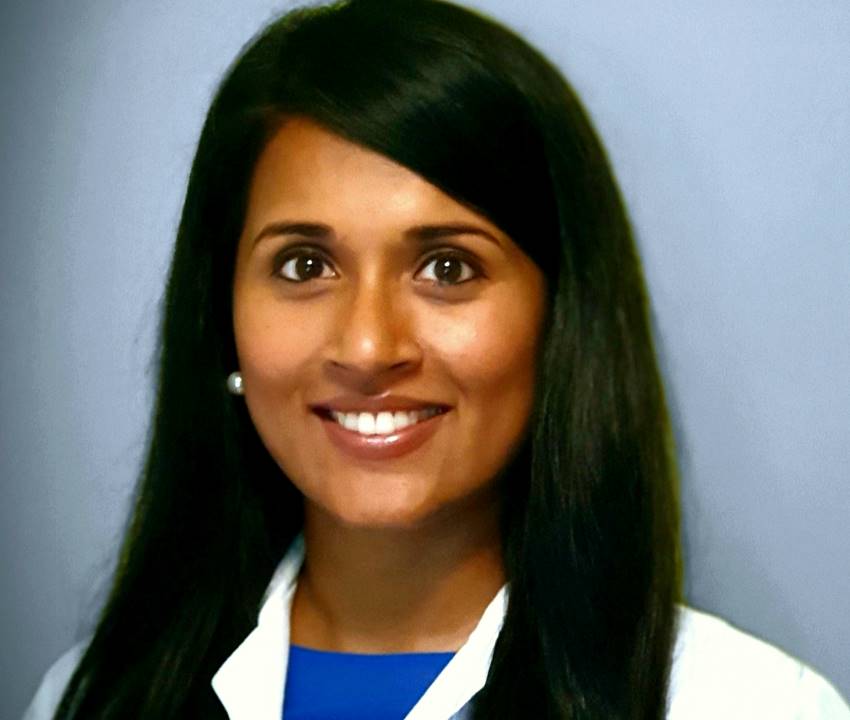BY VEENA RAO
Atlanta, GA, May 12, 2020: Dr. Lakshmi Sridharan is an advanced heart failure and transplant cardiologist and an assistant professor of medicine at Emory University. During the pandemic, she started a podcast, This COVID Life, where she discusses experiences about working on the frontline.
In this Q&A with NRI Pulse, Dr. Sridharan says the pandemic is not going away any time soon, and that the anxiety she felt early on has transitioned now to feeling empowered that she can serve and contribute to her community.
How has being on the frontline during a pandemic changed your life?
For one thing, I have stayed away from seeing my family — my parents, whom I normally see every 4-6 weeks, are very important to me, and I have not seen them since February. I am not sure when I will be able to see them next, but that has definitely been hard. I also try to be vigilant about social distancing with everyone as much as I can and avoid spending time with anyone who has underlying medical conditions or may be older.
It has also just opened up my eyes to the fragility of our human ecosystem in that we cannot take anything for granted. I am trying much more to be mindful and present of the current moment now.
During this pandemic, I started a podcast, This COVID Life, with an old friend of mine. It is a way to tell our stories of the experiences we are going through and how the pandemic has changed our lives. It has been a really constructive way for us to process what we are going through and to also bring people in our lives closer together by sharing our stories.
How do you deal with the anxiety that comes with serving on the frontline? Where do you draw your strength from?
I think the anxiety I felt early on has transitioned now to feeling empowered that I have a way I can serve and contribute to my community. In a moment when many people feel helpless, I feel privileged to have a way to serve each and every day. I meditate every morning to help center my thoughts and dedicate my meditation practice to someone I think needs my support that day. Thinking beyond myself has been a great source of internal strength.
What’s the general mood like among frontline workers?
In the beginning, the uncertainty and fear was palpable in the restlessness amongst healthcare workers in the hospital. Now, we are really focusing on how to ramp up how we provide care to all of our patients with medical problems aside from COVID-19. As an advanced heart failure and transplant cardiologist, I usually take care of some of the sickest patients. We want to make sure we are providing them the care that they need and the procedures that they need while protecting them from COVID-19. Given our dedicated focus, I perceive that everyone on our team is working to be as collaborative and innovative as possible to find new and unique ways to provide healthcare for all of patients while maintaining social distancing.

I came across your opinion piece in the AJC, where you’ve said that if there is anything you’ve have learned from being on the frontlines, it is that we as Americans can come together as we never have before in most of our lifetimes. Do you still feel the same way? What other lessons have the past two months taught you?
Absolutely. I think that many Americans have not necessarily felt that strong unity since World War II aside from the 9/11. The novel coronavirus pandemic has brought all of us together — young, old, brown, black, white, any race/ethnicity, and every socioeconomic status to the frontlines in a way because we are all encountering the same enemy — a pandemic virus. More than anything, I personally want to be and hope for all of us to be cognizant about how the medical and socioeconomic fallout from COVID-19 is affecting the most vulnerable among us. This is what guarantees our long-term commitment to each other as Americans as we think about how to rebuild safely and sustainably.
Have you had more exposure to the virus since your essay came out in the AJC?
I have certainly been taking care of more patients with COVID since then, but thankfully, I have not had any known exposures without personal protective equipment (PPE). As we have been able to expand our testing and learn more about COVID-19, our ability to take precautions systematically has increased a great deal. For instance, our screening for all patients and visitors to the hospital become very robust, which we hope has made a difference.
Do you feel safer/unsafer now than you did after you tested negative for COVID-19 last month?
Honestly, the biggest factor driving my sense of security (or lack thereof) is the fact that COVID-19 has become much more familiar to me, both as a physician and in my day to day life. The data also shows us that the novel coronavirus is not going anywhere anytime soon, meaning that this is something I (and we all) have to get used to for the long haul. Given that, the best coping mechanism has been acceptance and moving forward with the task at hand in taking care of patients.
What do the next 2 months, 6 months, and the year ahead look like for you as a frontline physician, and for the rest of the world?
I will be honest — I do not think COVID-19 is going away any time soon. We need to start thinking of our short-term and near-term world as a COVID-19 world — how can we move forward knowing that the novel coronavirus will be with us not just for a few months, but possibly another year or two. For me, I am brainstorming ways with my team about how to contribute to the COVID-19 effort but also take care of our heart failure and heart transplant patients. We still need to continue to do heart transplants safely and keep people alive who depend on our services throughout the COVID-19 pandemic. Brainstorming and innovation have become the next frontier of a COVID-19 world, both in medicine but also in everyone’s day-to-day lives. We have to come up with new ways to engage with each other and connect with one another despite the fact that we all may not be able to gather as we once did.
Governor Kemp reopened Georgia earlier this month. Your thoughts? What’s your advice for people who can’t stay home any longer?
I worried a lot about Georgia’s early reopening. I worry about a second spike in cases or the prolongation of the current spike; I worry there will be new hotspots of COVID-19 in Georgia. We have already started to see some of that in northeast Georgia.
The best advice I can give anyone is to wash your hands, wear a mask, continue to practice social distancing even when you have to leave the house, and don’t be afraid to ask for help. This is a challenging time for everyone, mentally and physically. It is okay to need support during this time; we are all here for one another.
FOLLOW NRI PULSE ON INSTAGRAM FOR NEWS IN PICTURES





